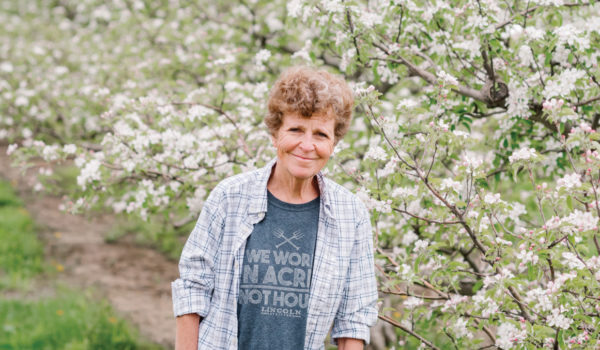
By Glenda Winders // Photography by Stacy Able
The Apple Works’ Sarah Brown celebrates 30 years in the business
When Sarah Brown was studying microbiology at Ohio State University, she could not have imagined that she was preparing herself to be a farmer. But that’s exactly what her life had in store.
After college, Brown headed to Eli Lilly and Co., where she worked for 10 years as a microbiologist in a fungal lab. When she left to raise a family — daughters Alison and Maggie — she grew so many plants in the yard of her Trafalgar home that her husband finally asked her if she had considered doing it commercially.
She gave it some thought. “Yeah, I think I could do that,” she said.
And that’s how The Apple Works began.
Celebrating its 30th anniversary this year, the orchard has grown into an attraction that draws people from all over the state and beyond. Brown is the orchardist, while her husband, Rick Brown, takes care of the financial part of the business. They started small, beginning with buying a neighbor’s farm.
“We started with 10 acres, and now we have 135,” Sarah Brown says. “We thought we had done something when we planted 200 trees in 1989. Now we have 10,000 trees.”
Initially they sold apples from a picnic table; then they began building a barn in 1992 that they have been expanding ever since. In 1994, having learned how capricious the apple-growing business can be, they diversified by adding a bakery. The year after, a hailstorm ruined the appearance of many of their apples and made them unmarketable, so they were able to turn them into pies, dumplings and doughnuts that they made from scratch with Indiana-ground flour. They also added homemade cider and fudge to their menu.
Rooted in science
“I don’t need to go to a casino to gamble,” Brown says. “When you grow a perennial crop that you don’t have a chance to replant, you have to worry about the elements: hard freezes, high winds and hail. There are many things that can get you into trouble for a year.”
That’s where the microbiology training comes in handy.
“In our wet climate the biggest challenge isn’t insects. It’s diseases. We’re challenged with many, many fungal diseases that keep me on my toes, so my background turned out to be very helpful.”
Fungal organisms produce spores in the billions and can be devastating, but insects are still a problem, too. By studying their reproductive behaviors and noting the temperatures at which they grow and develop, however, it’s easier to treat them. Brown and her team can get ahead of these conditions with fewer chemicals and “softer” sprays when they understand their life cycles. They must also constantly monitor the soil to ensure optimum growing conditions.
“There’s a lot of science about it,” she says. “People tend to think that being a farmer is a simplistic sort of existence, but it’s not. Any farmer can tell you about the challenges they have to confront to grow a crop.”
An apple takes days
There’s a lot of hard work involved, too. Brown gets up at 5 a.m. in the growing season and works long days planting, pruning, harvesting and experimenting with new techniques and varieties.
“We have lots of late nights,” she says. “In fact, I’ve seen the sunrise from my tractor.”
And sometimes running an orchard can be dangerous, as when Brown fell off a ladder and shattered her leg. The doctor told her she was facing a long recuperation, but she had different plans.
“I told him, ‘You’ve got to realize I have to be strong enough to push down the clutch on my tractor by mid-March.’”
Running the orchard also requires a dependable staff. Currently Brown employs 30 full-time workers, but the number swells to about 100 during the harvest season. And when people start working at The Apple Works, they typically don’t want to leave. Take, for example, Janice Sallee, manager of the retail barn, who has been here for 20 years.
“This is one of the best places I’ve ever worked,” she says. “Sarah works harder than anybody, and when you’ve got someone working this hard right next to you, you don’t want to go anywhere. She’s such an inspiration to me.”
Five of Sallee’s sons have worked at the orchard, too. She says now they’ve grown into hardworking young men, and she gives the credit to Brown. But another reason she enjoys her work is the loyal customer base, some of whom have been coming since the orchard opened.
“A lot of the same people continue to come in year after year, and now it’s generations —not just them but also their children and grandchildren,” she says. “Seeing those familiar faces and the appreciation we get from them really means a lot. I feel more of a connection here than anyplace else I could be employed.”
It all stems from here
Over the years the Browns have added many events and activities they couldn’t have envisioned when they began: a petting farm, a super slide and a straw mountain, which are all free. Other possibilities are pony rides and train rides through the orchard. Their greenhouse opens in April, and the Saturday before Mother’s Day they host a mother-daughter lunch. They hold a Scottish Highlander festival in September and put on occasional farm-to-fork dinners in the barn. There’s also a gift shop that Brown stocks with unusual gifts and décor items along with the jams and sauces you might expect.
“We’re on the edge of Brown County,” Brown says, “so it’s sort of an introduction to the Brown County world of art. We try to get unique things.”
During the summer they also sell blackberries, asparagus, tomatoes, cucumbers, Asian pears and sweet cherries grown on the farm and supplement with other seasonal vegetables, such as peaches and green beans, grown by their neighbors. They host weddings (except for the two busiest months of September and October) in a wooded venue; there, the bride and groom cross a bridge to say their vows, then return for the reception in a well-equipped shelter house. Although The Apple Works offers a “you-pick” pumpkin patch, it doesn’t allow visitors to pick their own apples in the way some similar operations do.
“We’re apple snobs,” Brown says. “We want to pick the apples at the peak of their flavor, and with 70 varieties of apples, we don’t want people to go to a tree that isn’t ready at that time.”
But they delight in having visitors taste perfectly ripe apples in the same way wineries offer tastings of their wines. Very often customers are astounded to learn the flavor differences and complexities when they enjoy their samples.
One of the people who comes every year is Linda Allman, who drives from Columbus. She cherishes a picture of her grandson — then a baby and now 19 — sitting among the pumpkins here.
“I love it because it’s family-oriented and there’s something for everyone,” she said. “We always look forward to going. The people are so nice and friendly, and the drive is beautiful. I know some people who got married there, and they said it was the perfect wedding.”
Allman buys enough Honeycrisp apples to make pies all winter, but her favorite treat is having a caramel apple for dessert after a Sunday visit to the farm.
The Browns’ two daughters love their parents’ orchard, but their passions have taken Alison to Vermont to be a charter school consultant, and Maggie to California, where she is a biochemist. But Brown’s forebears had an interest in growing things. Her grandmother came from a large commercial orchard in Ohio, and a favorite aunt raised fruit and roses.
“I’ve always felt that I’m on a mission to complete something that had already been started along the way,” she says. “The apple doesn’t fall far from the tree.”


